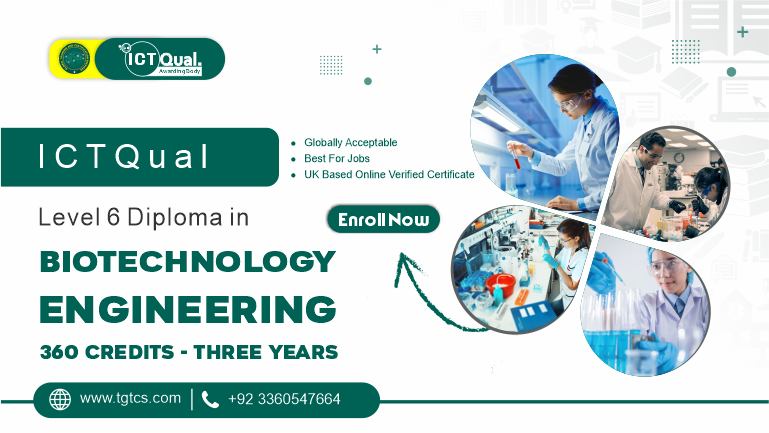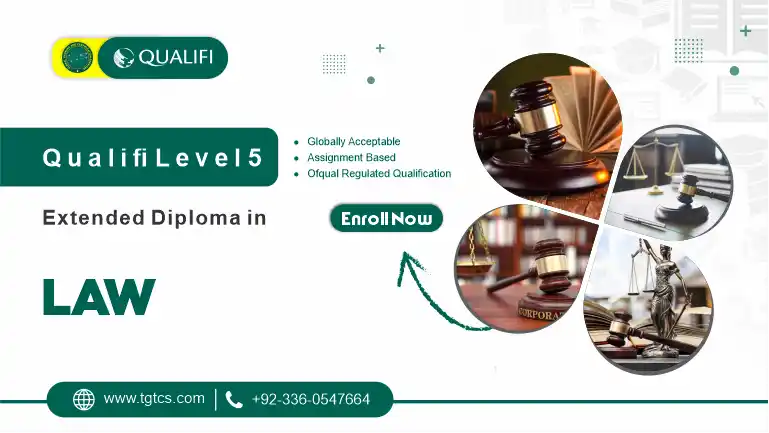ICTQual Level 6 Diploma in Biotechnology Engineering 360 Credits – Three Years
If you’re passionate about innovation in the fields of biology, technology, and engineering, the ICTQual Level 6 Diploma in Biotechnology Engineering is the ideal course to help you develop the expertise needed to excel in this exciting and rapidly growing field. Spanning three years, this 360-credit program offers a comprehensive curriculum that blends scientific principles with cutting-edge technology to prepare you for a successful career in biotechnology engineering.
The ICTQual Level 6 Diploma in Biotechnology Engineering provides you with a strong foundation in biotechnology, alongside a deep understanding of engineering principles. Whether you want to focus on bioengineering, industrial biotechnology, or sustainable practices, this course equips you with the knowledge, technical skills, and hands-on experience necessary to make an impact in the biotechnology industry.
The ICTQual Level 6 Diploma in Biotechnology Engineering is designed for individuals who are interested in the intersection of biology, technology, and engineering. The ideal candidate for this course has a passion for scientific discovery and the practical application of biotechnology in solving real-world problems. Whether you come from a background in biology, chemistry, engineering, or related fields, this diploma will help you build the skills needed to pursue a rewarding career in biotechnology.
The Global Training and Certification Services (TGTCS) is Directly Approved Training Centre of ICTQual
The ICTQual Level 6 Diploma in Biotechnology Engineering (360 Credits – Three Years) is an advanced qualification designed to equip students with the essential knowledge and skills needed to succeed in the dynamic field of biotechnology. This three-year program combines engineering principles with cutting-edge biotechnological applications, focusing on areas such as genetic engineering, bioprocessing, bioinformatics, and sustainability.
Throughout the course, students will gain a deep understanding of biological processes and the engineering techniques used to optimize them, preparing them for a wide range of careers in industries like healthcare, agriculture, pharmaceuticals, and environmental management. The curriculum includes hands-on laboratory work, industry placements, and project-based learning, ensuring students are well-prepared for real-world challenges.
Graduates of the ICTQual Level 6 Diploma in Biotechnology Engineering are well-equipped to pursue various career paths, such as biotechnological engineers, research scientists, genetic engineers, and sustainability consultants. The program’s emphasis on sustainable practices, innovative technologies, and practical experience makes it an excellent foundation for both professional growth and further academic studies in biotechnology or related fields.
Mandatory Units
ICTQual Level 6 Diploma in Biotechnology Engineering 360 Credits – Three Years:
Year 1: Foundations of Biotechnology Engineering
- Introduction to Biotechnology
- Principles of Molecular Biology
- Basics of Biochemistry
- Fundamentals of Microbiology
- Introduction to Genetics and Genomics
- Principles of Cell Biology
- Mathematics for Biotechnology
- Fundamentals of Biostatistics
- Introduction to Engineering in Biotechnology
- Analytical Techniques in Biotechnology
- Basics of Bioinformatics
- Environmental Science and Sustainability
Year 2: Intermediate Biotechnology Concepts
- Bioprocess Engineering and Design
- Applied Microbiology and Industrial Applications
- Recombinant DNA Technology
- Biomaterials and Nanotechnology
- Immunology and Vaccine Development
- Protein Engineering and Enzyme Technology
- Bioinformatics Tools and Applications
- Environmental Biotechnology and Waste Management
- Bioreactors and Fermentation Technology
- Biomedical Engineering Basics
- Advanced Biostatistics and Data Analysis
- Ethical and Regulatory Aspects of Biotechnology
Year 3: Advanced Topics and Specialization
- Genetic Engineering and Genomic Editing
- Advanced Bioprocess Engineering
- Biotechnology Research Methods
- Pharmaceutical Biotechnology and Drug Development
- Systems Biology and Computational Modeling
- Agricultural Biotechnology and GMOs
- Industrial Biotechnology and Bioeconomy
- Synthetic Biology Applications
- Advanced Environmental Biotechnology
- Innovation and Entrepreneurship in Biotechnology
- Biotechnology Project Management
- Final Year Research Project
Learning Outcomes for the Level 6 Diploma in Biotechnology Engineering (360 Credits – Three Years):
Year 1: Foundations of Biotechnology Engineering
- Introduction to Biotechnology
- Explain the scope and applications of biotechnology across various industries.
- Define key terms and concepts in biotechnology.
- Principles of Molecular Biology
- Understand the structure, function, and replication of DNA and RNA.
- Analyze molecular mechanisms of gene expression and regulation.
- Basics of Biochemistry
- Identify the structure and function of biomolecules such as proteins, lipids, carbohydrates, and nucleic acids.
- Understand metabolic pathways and enzyme activity.
- Fundamentals of Microbiology
- Describe microbial diversity, classification, and cell structures.
- Apply basic microbiological techniques for culturing and identifying microorganisms.
- Introduction to Genetics and Genomics
- Understand Mendelian inheritance, genetic variation, and genome organization.
- Explain the role of genomics in modern biology.
- Principles of Cell Biology
- Describe cell structure and function, including communication mechanisms.
- Analyze cell cycle processes and cellular responses to environmental stimuli.
- Mathematics for Biotechnology
- Apply mathematical principles and models to solve biotechnology problems and interpret biological data.
- Fundamentals of Biostatistics
- Conduct basic statistical analyses relevant to biotechnology research.
- Interpret experimental data using statistical methods.
- Introduction to Engineering in Biotechnology
- Understand how engineering principles apply to biotechnology processes and industrial applications.
- Analytical Techniques in Biotechnology
- Demonstrate knowledge of spectroscopic, chromatographic, and imaging techniques.
- Apply these techniques to analyze biological samples.
- Basics of Bioinformatics
- Utilize bioinformatics tools for DNA, RNA, and protein sequence analysis.
- Understand computational approaches in biotechnology.
- Environmental Science and Sustainability
- Explain biotechnology’s role in environmental conservation.
- Understand sustainable practices for waste management and resource utilization.
Year 2: Intermediate Biotechnology Concepts
- Bioprocess Engineering and Design
- Understand bioprocess development principles and scale-up techniques.
- Design and optimize biotechnological processes for industrial use.
- Applied Microbiology and Industrial Applications
- Apply microbial biotechnology to industries like food, pharmaceuticals, and agriculture.
- Analyze microbial contributions to biotechnological innovations.
- Recombinant DNA Technology
- Perform DNA cloning, transformation, and expression techniques.
- Understand recombinant DNA technology applications in research and industry.
- Biomaterials and Nanotechnology
- Explore biomaterial properties and their applications in biotechnology.
- Understand the role of nanotechnology in drug delivery and diagnostics.
- Immunology and Vaccine Development
- Describe the components and functions of the immune system.
- Understand vaccine production and immunotherapeutic applications.
- Protein Engineering and Enzyme Technology
- Analyze protein structure-function relationships.
- Apply engineering techniques to optimize enzymes for industrial use.
- Bioinformatics Tools and Applications
- Use advanced bioinformatics tools for genome annotation and functional analysis.
- Apply computational biology to solve biotechnological problems.
- Environmental Biotechnology and Waste Management
- Investigate biotechnological approaches to environmental restoration.
- Analyze bio-based waste recycling and pollution control strategies.
- Bioreactors and Fermentation Technology
- Explain bioreactor operations and design principles.
- Optimize fermentation processes for large-scale production.
- Biomedical Engineering Basics
- Understand the intersection of biotechnology and engineering in medical applications.
- Analyze the role of biomedical devices and technologies.
- Advanced Biostatistics and Data Analysis
- Apply advanced statistical methods to complex datasets.
- Interpret and analyze research findings using biostatistical software.
- Ethical and Regulatory Aspects of Biotechnology
- Understand ethical issues in biotechnology research and applications.
- Analyze global regulations governing biotechnology practices.
Year 3: Advanced Topics and Specialization
- Genetic Engineering and Genomic Editing
- Apply advanced genome editing techniques such as CRISPR.
- Understand the ethical and societal implications of genetic engineering.
- Advanced Bioprocess Engineering
- Design, optimize, and troubleshoot bioprocess systems.
- Evaluate the cost-efficiency and effectiveness of industrial bioprocesses.
- Biotechnology Research Methods
- Develop skills in experimental design and laboratory research.
- Conduct data collection and analysis for biotechnological research.
- Pharmaceutical Biotechnology and Drug Development
- Understand biopharmaceutical development processes.
- Analyze biotechnology’s role in personalized medicine.
- Systems Biology and Computational Modeling
- Use computational models to study complex biological systems.
- Integrate omics data to understand biological networks.
- Agricultural Biotechnology and GMOs
- Explain the principles of genetic modification in crops.
- Analyze the impact of agricultural biotechnology on food security.
- Industrial Biotechnology and Bioeconomy
- Explore bio-based production methods for chemicals, fuels, and materials.
- Examine the economic and environmental impacts of industrial biotechnology.
- Synthetic Biology Applications
- Design and construct synthetic biological systems.
- Analyze the applications of synthetic biology in various industries.
- Advanced Environmental Biotechnology
- Apply advanced methods for bioremediation and sustainable development.
- Understand biotechnology’s role in mitigating climate change.
- Innovation and Entrepreneurship in Biotechnology
- Develop entrepreneurial skills for biotech ventures.
- Identify market trends and opportunities in the biotech industry.
- Biotechnology Project Management
- Plan, execute, and manage biotechnology projects.
- Develop skills in budgeting, resource allocation, and team coordination.
- Final Year Research Project
- Conduct independent research on a selected biotechnology topic.
- Present findings in a comprehensive report and defend during evaluation.
Course Benefits of the ICTQual Level 6 Diploma in Biotechnology Engineering (360 Credits – Three Years):
- Comprehensive Skill Development
The ICTQual Level 6 Diploma in Biotechnology Engineering offers a well-rounded curriculum that equips students with both theoretical knowledge and practical skills in biotechnology, molecular biology, microbiology, genetic engineering, bioprocess design, and bioinformatics. The course emphasizes hands-on learning, providing students with industry-relevant skills in experimental techniques, research methodologies, and advanced biotechnological applications. - Industry-Relevant Expertise
The course prepares graduates for a wide range of roles in the biotechnology sector, including pharmaceutical development, environmental biotechnology, agricultural biotechnology, and bioprocessing. Graduates gain the expertise necessary to innovate and contribute to various industries, including healthcare, agriculture, energy, and environmental conservation. - Advanced Technological Knowledge
Students will gain in-depth knowledge of advanced biotechnology concepts, such as genetic engineering, synthetic biology, bioreactor design, and biopharmaceutical development. This solid foundation in cutting-edge technologies positions graduates to become leaders in the rapidly evolving biotechnology sector. - Specialization Opportunities
In the final year, students can specialize in areas such as pharmaceutical biotechnology, agricultural biotechnology, environmental sustainability, or bioengineering. This allows students to tailor their education to align with their career aspirations and industry needs. - Hands-on Practical Experience
The course includes lab-based learning, internships, and a final-year research project, which ensures students are well-prepared for the workforce. The practical exposure to biotechnology tools and techniques enhances problem-solving and critical thinking abilities, which are essential in real-world applications. - Strong Career Prospects
The biotechnology sector is growing globally, with increasing demand for professionals in genetic engineering, bioinformatics, pharmaceutical development, and environmental sustainability. Graduates of this diploma program can pursue careers as biotechnologists, biomedical engineers, bioinformaticians, and more, in industries ranging from pharmaceuticals to agriculture and environmental services. - Global Opportunities
Biotechnology is a global industry, and the skills developed during this course are transferable across borders. Graduates can explore international career opportunities with multinational companies, research institutions, and governmental organizations. The diploma provides a globally recognized qualification that opens doors to worldwide employment prospects. - Entrepreneurship and Innovation
The course emphasizes entrepreneurship, equipping graduates with the skills to start their own biotech ventures or consultancies. This is an ideal benefit for students interested in launching innovative biotechnology start-ups or developing sustainable, environmentally-friendly technologies. - Academic Progression
The Level 6 Diploma in Biotechnology Engineering lays a solid foundation for further academic studies, such as a Master’s degree or PhD in biotechnology, bioengineering, or related fields. The advanced knowledge and research skills gained from this course can be leveraged for academic advancement and further specialization in biotechnology. - Ethical and Regulatory Knowledge
The course provides students with a strong understanding of the ethical and regulatory considerations in biotechnology, particularly related to genetic modification, clinical trials, and environmental impact. This knowledge is crucial for navigating the complex legal and ethical landscapes in the biotechnology industry. - Increased Employability
With a combination of practical skills, advanced knowledge, and professional certifications, graduates are highly employable in the biotechnology field. The course’s focus on real-world application, research methodologies, and industry-relevant skills significantly boosts employability and career advancement opportunities.
By completing the ICTQual Level 6 Diploma in Biotechnology Engineering, students will be ready to contribute to the future of biotechnology with advanced skills that meet industry demands, providing them with numerous career and academic progression opportunities.
Ideal Learner for the ICTQual Level 6 Diploma in Biotechnology Engineering (360 Credits – Three Years)
The ICTQual Level 6 Diploma in Biotechnology Engineering is designed for individuals who are passionate about the intersection of biology, technology, and engineering. The ideal learner for this course possesses the following characteristics:
- Strong Interest in Science and Technology
The ideal learner should have a keen interest in scientific fields, particularly biotechnology, molecular biology, and engineering. A fascination with how biological systems can be harnessed for industrial, medical, and environmental purposes is crucial for success in this program. - Background in Science or Engineering
This course is suited for students with a foundational background in science (such as biology, chemistry, or physics) or engineering disciplines. Learners with A-levels, or equivalent qualifications, in subjects like biology, chemistry, physics, or mathematics, will have a solid foundation to build upon in this program. Prior exposure to basic laboratory techniques or introductory engineering principles will be advantageous. - Problem-Solving and Analytical Thinkers
Biotechnology engineering involves addressing complex biological and technological problems. The ideal learner should enjoy problem-solving and have strong analytical thinking skills, which are necessary for troubleshooting issues, conducting experiments, and developing innovative solutions to challenges in biotechnology. - Motivation for Innovation and Research
The course is ideal for students who aspire to be at the forefront of biotechnology innovations. The ideal learner should be motivated to engage in research and development activities, contributing to the development of new technologies, processes, and solutions in the biotechnology and life sciences sectors. - Career-Oriented and Ambitious
Learners who are eager to pursue a career in biotechnology, bioengineering, environmental science, or related fields will thrive in this course. Whether the goal is to work in the biotechnology industry, pursue higher education, or start a biotech business, the ideal learner should be focused on advancing their career in these dynamic and growing sectors. - Attention to Detail and Precision
Biotechnology engineering requires careful and precise work, especially when dealing with biological samples, laboratory experiments, and data analysis. The ideal learner should be meticulous, able to follow complex protocols, and maintain accuracy in both experimental and theoretical tasks. - Adaptability and Teamwork
Biotechnology projects often involve interdisciplinary collaboration. The ideal learner should be adaptable, open to learning from various fields, and comfortable working in diverse teams that include scientists, engineers, and business professionals. - Ethical Awareness and Responsibility
Given the ethical considerations in biotechnology, particularly related to genetic engineering, environmental impacts, and medical applications, the ideal learner should possess a strong sense of ethics and a desire to ensure that their work benefits society in a responsible and sustainable way. - Strong Mathematical and Statistical Skills
As biotechnology engineering involves data analysis, biostatistics, and mathematical modeling, the ideal learner should be comfortable with mathematics, including algebra, calculus, and statistical analysis. These skills are essential for interpreting experimental data and optimizing biotechnological processes. - Eager to Contribute to Sustainability
The biotechnology sector is increasingly focused on sustainability, environmental conservation, and improving public health. The ideal learner should be driven by the desire to make a positive impact on the world, whether through innovations in green biotechnology, bioremediation, sustainable agriculture, or healthcare solutions.
In summary, the ideal learner for the ICTQual Level 6 Diploma in Biotechnology Engineering is someone with a strong scientific and engineering background, an interest in biotechnology, and a passion for research, innovation, and solving real-world problems. They should be motivated to make a difference in industries such as healthcare, environmental conservation, and agriculture while developing the skills necessary to excel in this rapidly evolving field.
The ICTQual Level 6 Diploma in Biotechnology Engineering provides students with the essential knowledge and skills to pursue a wide range of advanced academic and professional opportunities. Graduates of this three-year program can explore several pathways to advance their careers in the biotechnology sector:
1. Professional Career Pathways
The diploma prepares graduates for diverse roles within the biotechnology industry, including:
- Biotechnology Engineer: Design, develop, and optimize biotechnological processes for industrial, pharmaceutical, or medical applications.
- Research Scientist: Conduct groundbreaking research in areas such as genetic engineering, vaccine development, and environmental biotechnology.
- Quality Control/Assurance Specialist: Ensure biotech manufacturing and production processes adhere to industry standards and regulatory requirements.
- Bioinformatics Analyst: Utilize computational tools to analyze biological data and support research and development initiatives.
- Environmental Biotechnologist: Apply biotechnological solutions to environmental challenges, including bioremediation, waste management, and sustainable development.
2. Entrepreneurship and Startups
Graduates with an entrepreneurial spirit can venture into creating their own biotech startups, focusing on:
- Developing innovative bioproducts, such as biofuels, biodegradable materials, or therapeutic drugs.
- Offering consulting services for biotechnology research, process optimization, or industrial applications.
- Providing sustainable solutions for agriculture or environmental management.
3. Teaching and Training
For those interested in academia, this diploma opens opportunities to become educators or trainers in biotechnology and related fields. Graduates can teach at vocational institutions, support industry training programs, or contribute to continuing education in biotech sectors.
4. Industry-Specific Opportunities
The diploma is aligned with the needs of various key industries, enabling graduates to work in sectors such as:
- Pharmaceuticals and Healthcare: Engage in drug discovery, development, and biopharmaceutical production processes.
- Agriculture and Food: Work on enhancing crop yields, developing GMOs, or advancing food biotechnology.
- Environmental Organizations: Contribute to solving global environmental issues, such as pollution control and climate change, through biotechnological innovations.
This diploma is not only a gateway to immediate career opportunities but also offers the foundation for lifelong learning and professional advancement in the rapidly evolving biotechnology field.
Course Overview
Course Level
Level 6
Course Units
36 Mandatory Units
Duration
Three year






